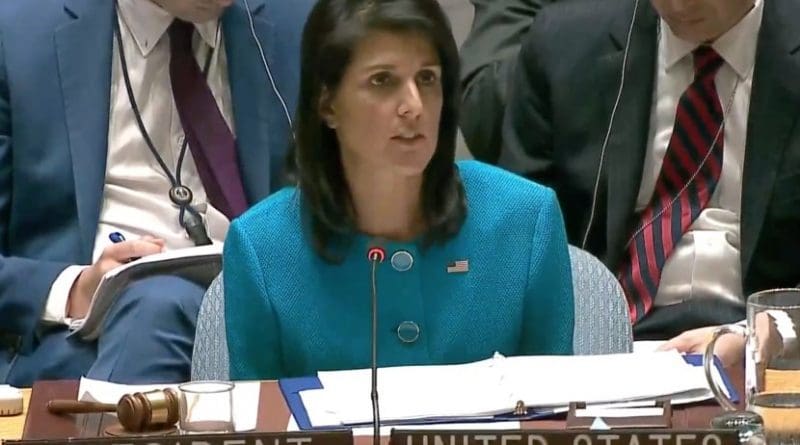Haley’s Long Count At The UN – OpEd
This Christmas holiday, the US’s top envoy to the UN, Nikki Haley, the self-described “new sheriff in town,” will be busy taking down names, like a harsh principal out to get the unruly pupils, with the long whip of threats and retributions against the countries that endorsed the UN General Assembly resolution on the status of Jerusalem, the whole 128 of them. “For those who don’t have our backs, we ‘re taking names,” she had warned prior to the vote that was widely interpreted in the international community as a solid rebuke of Trump’s decision to recognize Jerusalem as Israel’s capital and to move the US embassy there. Haley’s own name, however, might be numbered, by the consequential embarrassment and damages to US’s global prestige inflicted by Haley’s dictatorial style foreign to UN diplomacy.
The question, then, is how long can the US afford to be represented by someone so out of tune with the protocols of world diplomacy requiring tactfulness and nuance? Haley’s supporters will no doubt rush to her defense by arguing that she represents the defiant spirit of her boss, President Trump, who has trashed the UN repeatedly in his speeches, reducing it to a talk shop, even though the US Congress continues to appropriate funds for the UN, based on a simple understanding that the UN is vital for US’s global leadership.
There is, as a result, a certain disconnect between the rhetoric and action of the US with respect to the UN, seeing how the US continues to manipulate the Security Council, e.g., vis-à-vis North Korea. To his small credit, last September in his first UN speech, Trump refrained from his usual diatribe against the UN, enjoying the podium to broadcast his quintessentially Trumpesque, and one might say perverted, view of the world affairs, depicting the US a global moral good that can do no harm!
But, having survived year one of Trump’s presidency, the world can now have a small sigh of relief, wondering what comes next? North Korea, slapped with new UN sanctions, may retaliate by more ‘rogue’ behavior that could spell trouble for world peace, and on January 13th, Trump has to decide what to do with the Iran nuclear accord, that he has vilified as one the worst deals in history? Concerning the latter, after his early October refusal to certify the deal, which is not technically speaking the same thing as ‘decertification,’ Trump hurled the matter to the bosom of US Congress, to “fix it or nix it,” yet Congress, as rightly predicted by this author, has done neither, avoiding any rash move to tamper with the Iran nuclear agreement, which most experts agree is in US’s own national security interests, a view echoed by several top Trump officials including the secretaries of defense and state, James Mattis and Rex Tillerson.
In line with a new “Iran policy” after much internal debate, Trump is geared to adopt a more aggressive anti-Iran posture, which is somewhat problematic because of the range of shared US-Iran interests, with respect to ISIS terrorism, Iraq’s and Afghanistan’s stability, narco-traffic, etc. In other words, the Manichean rhetoric against Iran is dysfunctional and hides the non-zero sum nature of US-Iran competition that, as in the case of Iraq, has put the US’s and Iranian forces on parallel tracks for some three to four years now. Consequently, by catering to Saudi Arabia and its calls for a robust Iran-bashing US stance, the Trump administration would be in effect harming its own interests, a recipe for disaster, whereby a more nuanced US policy would seek to telescope the nuclear accord to non-nuclear issues such as regional security issues and, perhaps, even contemplate replicating the post-accord Europeans’ attitude of reaping the benefits of a post-sanctions Iran, instead of self-sanctioning US’s firms from doing business with Iran.
In a word, the White House’s new Iran policy leaves a lot to be desired and, logically-speaking, ought to be rescripted in favor of a more complex, multi-layered, nuanced approach that recognizes the uneasy coexistence of competing and shared interests with Iran. Should Trump in his year two at the White House evolve in this direction, then there is room for optimism that come January 13th, he will focus on other important things on his plate, instead of scuttling a deal that has brought a measure of stability to the volatile Middle East, in light of the constant threats of military action against Iran in the pre-accord era, which neither the region nor the world as a whole has the stomach to relive.
Fact of the matter is that after the horrifying experiences of the past few years in terrorism-infested Middle East, the region is beginning to recover slowly and, in fact, is in dire need of a WWII-style Marshal Plan, with so many dozens upon dozens of cities and towns devastated by war, some of which like the war in Yemen is still on-going, to the horror of world’s humanitarian officials. Hopefully, peace in Yemen will be a top priority in 2018 and US’s envoy Haley will step down and be replaced by someone with a pleasant demeanor who can advance US’s ‘soft power’.

